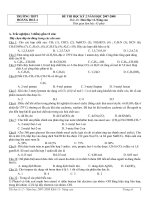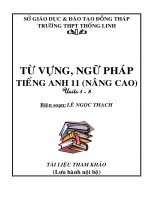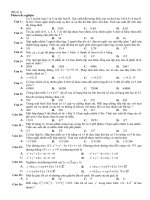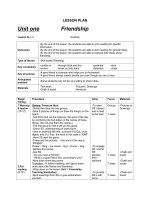Exercises 11 NC
Bạn đang xem bản rút gọn của tài liệu. Xem và tải ngay bản đầy đủ của tài liệu tại đây (81.57 KB, 9 trang )
GERUND AND INFINITIVE
Put the verbs in brackets into the correct form (gerund or infinitive)
1 I am looking forward to (see) you.
2 He dreads (have) to retire.
3 I arranged (meet) them here.
4 He urged us (work) faster.
5 I wish (see) the manager.
6 It's no use (wait).
7 He warned her (not touch) the wire.
8 Don't forget (lock) the door before (go) to bed.
9 My mother told me (not speak) to anyone about it.
10 I can't understand her (behave) like that.
11 He tried (explain) but she refused (listen).
12 At dinner she annoyed me by (smoke) between the courses.
13 You are expected (know) the safety regulations of the college.
14 He decided (disguise) himself by (dress) as a woman.
15 lam prepared (wait) here all night if necessary.
16 Would you mind (show) me how (work) the lift?
17 After (walk) for three hours we stopped to let the others (catch with us.
18 I am beginning (understand) what you mean.
19 He was fined for (exceed) the speed limit.
20 The boys like (play) games but hate (do) lessons.
21 I regret (inform) you that your application has been refused.
22 I couldn't help (overhear) what you said.
23 Mrs Jones: I don't allow (smoke) in my drawing-room.
Mrs Smith: I don't allow my family (smoke) at all.
24 He surprised us all by (go) away without (say) 'Good-bye'.
25 Please go on (write); I don't mind (wait).
26 He wore dark glasses (avoid) (be) recognized.
27 Before (give) evidence you must swear (speak) the truth.
28 I tried (persuade) him (agree) with your proposal.
29 Your windows need (clean); would you like me (do) them for you?
30 Would you mind (shut) the window? I hate (sit) in a draught.
31 I can't help (sneeze); I caught a cold yesterday from (sit) in a draught.
32 Do stop (talk): I am trying (finish) a letter.
33 His doctor advised him (give up) (jog).
34 My watch keeps (stop). ~ That's because you keep (forget) (wind) it.
35 Without (realize) it. he hindered us instead of (help) us.
36 People used (make) fire by (rub) two sticks together.
ANSWER KEY
1 seeing 2 having 3 to meet 4 to work 5 to see 6 waiting 7 not to touch 8 to lock, going 9 not to speak 10 behaving 11 to
explain, to listen 12 smoking 13 to know 14 to disguise, dressing 15 to wait 16 showing, to work 17 walking, catch
up 18 to understand 19 exceeding 20 playing, doing 21 to inform 22 overhearing 23 smoking, to smoke 24 going, saying
25 writing, waiting 26 to avoid being 27 giving, to speak 28 to persuade, to agree 29 cleaning, to be cleaned, to do 30
shutting, sitting 31 sneezing, sitting 32 talking, to finish 33 to give up jogging 34 stopping, forgetting to wind 35 realizing,
helping 36 to make, rubbing
Put the verbs in brackets into the correct form (gerund or infinitive).
1. He hates (answer) the phone, and very often just lets it (ring).
2. If you go on (let) your dog (chase) cars he'll end by (be) run over.
Page 1
3. I prefer (drive) to (be driven).
4. I advise you (start) (look) for a flat at once.
5. Would you mind (lend) me Ј5? I forgot (cash) a cheque.
6. (Lie) on this beach is much more pleasant than (sit) in the office.
7. She likes her children (go) to the dentist every six months.
8. By (neglect) (take) ordinary precautions he endangered the life of his crew.
9. An instructor is coming (show) us how (use) the aqualung.
10. I have no intention of (go) to that film; I couldn't bear (see) my favourite actress in
such a dreadful part.
11. I suggest (telephone) the hospitals before (ask) the police (look) for him.
12. After (hear) the conditions I decided (not enter) for the competition.
13. Some people seem (have) a passion for (write) to the newspapers.
14. He expects me (answer) by return but I have no intention of (reply) at all.
15. I tried (explain) to him but he refused (listen) and went on (grumble).
16. By (offer) enormous wages he is persuading men (leave) their present jobs and (work) for him.
17. He postponed (make) a decision till it was too late (do) anything.
18. Imagine (have) (get up) at five a.m. every day!
19. Try (forget) it: it isn't worth (worry) about.
20. There is no point in (remain) in a dangerous place if you can't do anything (help) the people who have (stay) there.
21. The horse won't be well enough (run) in tomorrow's race. He doesn't seem (have recovered) from his long journey.
22. At first I enjoyed (listen) to him but after a while I got tired of (hear) the same story again and again.
23. It is usually easier (learn) a subject by (read) books than by (listen) to lectures.
24. It wouldn't be safe (start) down now; we'll have (wait) till the mist clears.
25. After (discuss) the matter for an hour the committee adjourned without (have reached) any decision.
26. It's not much use (have) a bicycle if you don't know how (ride) it.
27. He didn't dare (leave) the house because he was afraid of (meet) someone who might (recognize) him.
28. I distinctly remember (pay) him. I gave him Ј2.
29. Did you remember (give) him the key of the safe? ~ No, I didn't. I'll go and do it now.
30. Please forgive me for (interrupt) you but would you mind (repeat) that last sentence?
31. I know my hair wants (cut) but I never have time (go) to the hairdresser's.
32. He made a lot of money by (buy) tickets in advance and (sell) them for twice the price on the day of the match.
33. She rushed out of the room without (give) me a chance (explain).
34. He keeps (ask) me the time and I keep (tell) him (buy) himself a watch.
35. He has a theory that it is possible (tell) the time in daylight by (look) into a cat's eyes.
36. I'd hate (be) beside a volcano when it started (erupt).
ANSWER KEY
1 answering, ring 2 letting, chase, being 3 driving, being driven 4 to start looking 5 lending, to cash 6 Lying, sitting 7 to go
8 neglecting to take 9 to show, to use 10 going, to see/seeing 11 telephoning, asking, to look 12 hearing, not to enter 13
to have, writing 14 to answer, replying 15 to explain, to listen, grumbling 16 offering, to leave, (to) work 17 making, to do
18 having to get up 19 to forget, worrying 20 remaining, to help, to stay 21 to run, to have recovered 22 listening, hearing
23 to learn, reading, listening 24 to start, to wait 25 discussing, having reached 26 having, to ride 27 (to) leave, meeting,
recognize 28 paying 29 to give 30 interrupting, repeating 31 cutting, to go 32 buying, selling 33 giving, to explain 34
asking, telling, to buy 35 to tell, looking 36 to be, to erupt/erupting
NOTA BENE
After like it is sometimes possible to use either gerund or infinitive, but there tends to be a slight difference in
implication.
* like + gerund usually means 'enjoy'; it also usually implies that the action is/was
performed: I like skating = I enjoy skating (and do skate).
* like + infinitive has more the meaning of 'approve of, like the idea or habit'. In the affirmative it gives no indication as
to whether the action is performed or not, and in the
negative implies that it is not performed.
Page 2
I didn't like saying it usually means I said it, unwillingly', but
I didn't like to say it usually means I didn't say it' (because it didn't seem right or sensible). The distinction, however, is
not rigid. The above notes are, therefore, only guides which may safely be followed.
Put the verbs in brackets into gerund or infinitive.
1. I used (ride) a lot but I haven't had a chance (do) any since (come) here. ~ I ride sometimes. Would you like (come) with
me next time?
2. Most people prefer (spend) money to (earn) it.
3. I resented (be) unjustly accused and asked him (apologize).
4. It isn't good for children (eat) too many sweets.
5. I didn't feel like (work) so I suggested (spend) the day in the garden.
6. Why do you keep (look) back? Are you afraid of (be) followed?
7. Do you remember (post) the letter? ~ Yes, I do; I posted it in the letter-box near my gate.
8. Did you remember (lock) the door? ~ No, I didn't. I'd better (go) back and (do) it now.
9. You still have a lot (learn) if you'll forgive my (say) so.
10. It's no use (try) (interrupt) him. You'll have (wait) till he stops (talk).
11. I'm for (do) nothing till the police arrive. They don't like you (move) anything when a crime has been committed.
12. He didn't like (leave) the children alone in the house but he had no alternative as he had (go) out to work.
13. Why didn't you drink it?- I didn't like (drink) it as I didn't know what it was.
14. I'm very sorry for (be) late. It was good of you (wait) for me.
15. I keep (try) (make) mayonnaise but I never succeed. ~ Try (add) the yolk of a hard-boiled egg.
16. Do you feel like (go) to a film or would you rather (stay) at home?
17. She told me (look) through her correspondence and (take) out any letters that you had written her. I didn't like (look)
through someone else's letters but I had (do) as she said.
18. He took to (get up) early and (walk) noisily about the house.
19. I liked (listen) to folk music much better than (listen) to pop.
20. The car began (make) an extraordinary noise so I stopped (see) what it was.
21. You'll never regret (do) a kind action.
22. He decided (put) broken glass on top of his wall (prevent) boys (climb) over it.
23. He annoyed me very much by (take) the piece of cake that I was keeping (eat) after my supper.
24. He kept (ring) up and (ask) for an explanation and she didn't know what (do) about him.
25. We got tired of (wait) for the weather (clear) and finally decided (set) out in the rain.
26. He made me (repeat) his instructions (make) sure that I understood what I was (do)
27. I suggest (leave) the car here and (send) a breakdown van (tow) it to the garage.
28. She apologized for (borrow) my sewing-machine without (ask) permission and promised never (do) it again.
29. I didn't mean (offend) anyone but somehow I succeeded in (annoy) them all.
30. She claimed (be able) (tell) the future by (gaze) into her crystal ball.
31. He never thinks of (get) out of your way; he expects you (walk) round him.
32. You don't need (ask) his permission every time you want (leave) the room.
33. The police accused him of (set) fire to the building but he denied (have been) in the area on the night of the fire.
34. I left my door open. Why didn't you walk in? ~ I didn't like (go) in when you weren't there.
35. It's much better (go) to a hairdresser than (try) (save) time by (cut) your own hair.
36. I'd rather (earn) my living by (scrub) floors than (make) money by (blackmail) people.
ANSWER KEY
1 to ride, to do, coming, to come 2 spending, earning 3 being, to apologize 4 to eat 5 working, spending 6 looking, being
7 posting 8 to lock, go, do 9 to learn, saying 10 trying to interrupt, to wait, talking 11 doing, to move/moving 12 leaving,
to go 13 to drink 14 being, to wait 15 trying to make, adding 16 going, stay 17 to look, (to) take, looking, to do 18 getting
up, walking 19 listening, listening 20 to make/making, to see 21 doing 22 to put, to prevent, climbing 23 taking, to eat 24
ringing, asking, to do 25 waiting, to clear, to set 26 repeat, to make, to do 27 leaving, sending, to tow
28 borrowing, asking, to do 29 to offend, annoying 30 to be able to tell, gazing 31 getting, to walk 32 to ask, to leave 33
setting, having been 34 to go 35 to go, (to) try to save, cutting 36 earn, scrubbing, make, blackmailing
Page 3
INFINITIVE, GERUND, PRESENT PARTICIPLE
Put the verbs in brackets into a correct form. When more than one form is possible it will be noted in the key.
1. When the painter felt the ladder (begin) (slip) he grabbed the glitter (save) himself from (fall).
2. The snow kept (fall) and the workmen grew tired of (try) (keep) the roads clear.
3. He offered (lend) me the money. I didn't like (take) it but I had no alternative.
4. What was in the letter? ~ I don't know. I didn't like (open) it as it wasn't addressed to me.
5. Do you remember (read) about it? ~ No, at that time I was too young (read) newspapers.
6. Did you remember (book) seats for the theatre tomorrow? ~ Yes, I have the tickets here. Would you like (keep) them? I
am inclined (lose) theatre tickets.
7. Try (avoid) (be) late. He hates (be) kept (wait).
8. I didn't know how (get) to your house so I stopped (ask) the way.
9. I wish my refrigerator would stop (make) that horrible noise. You can't hear anyone (speak).
10. This book tells you how (win) at games without actually (cheat).
11. The gunman began (fire). He felt a bullet (graze) his cheek.
12. He heard the clock (strike) six and knew that it was time for him (get) up.
13. I can hear the bell (ring) but nobody seems (be coming) (open) the door.
14. Did you advise him (go) to the police? ~ No, I didn't like (give) any advice on such a difficult matter.
15. He wanted (put) my chameleon on a tartan rug and (watch) it (change) colour.
ANSWER KEY
1 beginning to slip/begin to slip/begin slipping, to save, falling 2 falling, trying to keep 3 to lend, taking 4 to open 5
reading, to read 6 to book, to keep, to lose 7 to avoid being, being/to be, waiting 8 to get, to ask 9 making,
speak/speaking 10 to win, cheating 11 firing/to fire, graze 12 strike/striking, to get 13 ringing/ring, to be coming to open
14 to go, to give 15 to put, (to) watch, change/changing 16 to see, to avoid hitting 17 to be, crackling 18 climbing, to
explain, to say, to let, go 19 convincing, to get, leap 20 driving, doing, to do 21 to sit, (to) hear, howling 22 getting,
climbing, to do 23 roar/roaring, to move/moving, waving 24 writing, to do, to go, see 25 walking, to cross, thinking, to
chase 26 to be having, thudding 27 getting, to pay 28 to come, standing 29 to like making and flying . . . doing 30 to
arrive, rising 31 sawing, fall/falling 32 to see/seeing, crying/cry 33 jump/jumping, fall/falling 34 to wake, (to) hear, beating
35 beginning to roll/begin to roll/begin rolling, to do, to stop 36 laughing, slipping/slip
MISRELATED PARTICIPLES
A participle is considered to belong to the noun or pronoun that immediately precedes it (which usually, but not
necessarily, is the subject of the main verb).
The boy, climbing the tree to get birds' eggs, had a bad fall.
If there is no noun/pronoun in this position the participle is considered to belong to the subject of the following main
verb:
- Climbing the tree to get birds' eggs, the boy had a bad fall.
Sometimes this principle is disregarded and confusion results:
- Climbing down the tree, one of the eggs broke.
This word order makes it appear that the egg was climbing, which is nonsense.
A participle linked in this way to the wrong noun/pronoun is said to be 'misrelated'. The sentence should be rewritten:
- Climbing down the tree he broke one of the eggs or
- As he was climbing down the tree one of the eggs broke.
PRACTICE
Correct the sentences. Sometimes only a change of order is required.
1. When leaving a car in this car park the brakes must be left off.
2. Wading across the river, the current swept me off my feet.
Page 4
3. When filling a tank with petrol naked lights should be extinguished.
4. Running into the room, a rug caught her foot and she fell.
5. Reading the letter a second time, the meaning becomes clearer.
6. When carrying a gun it should never be pointed at anyone.
7. When planting these flowers care must be taken not to damage the roots.
8. Riding in his first race, his horse fell at the last jump.
9. When paying by cheque, a bank card should be shown.
10. Knowing me to be the fool of the family, the news that I had won a scholarship astonished him.
11. Believing that his last hour had come, his hands began to tremble.
12. Passing under a ladder, a pot of paint fell on my head.
13. Reading in bed, my hands often get very cold.
14. Leaving the cinema, it seemed to him that the film had been exceptionally bad.
15. Barking furiously, I led the dog out of the room.
16. Having paid my taxes, the amount left in the bank is hardly worth mentioning.
17. Writing my name in the hotel register, a familiar voice attracted my attention.
18. Tied to a post, the sea was tossing the boat up and down.
19. Misunderstanding the question, the wrong answer was sent in.
20. Shining in the sky, we saw the first star.
21. When driving carelessly it is easy to have an accident.
22. Pinned to the door by a knife, the man saw a notice.
23. Written in large letters they read the words 'No Entry'.
24. While cleaning his gun it went off unexpectedly.
25. Wondering where to go. an advertisement caught my eye.
26. Rushing out of (he house, a lorry knocked me over.
27. Sitting by the fire, it all comes back to me.
28. Flailing from such a height, we thought he would never survive.
29. When changing a fuse the electricity should first be switched off.
30. Towed behind the car, I saw a trailer with a boat on it.
31. While sitting at the foot of a cliff a stone fell on him.
32. Driving to work, the traffic jams infuriated him.
33. Dropped by parachute, the country seemed entirely unfamiliar.
34. Sitting in the dentist's chair, an idea suddenly occurred to me.
35. Weakened by his last illness, I felt sure that another winter in this country would kill him.
36. Getting out of bed, a scorpion bit him.
ANSWER KEY
1 When leaving a car . . . you must leave the brakes 2 As/When I was wading etc. or Wading across . . . I was swept off my
feet by 3 When a tank is being filled/When you are filling a tank 4 Running into the room, she caught her foot on a rug
and fell 5 When I read the letter 6 When carrying . . . you should never point it 7 When planting . . . you must take care 8
In his first race, the horse he was riding fell 9 When paying by cheque, you must show 10 Knowing me to be …, he was
astonished to hear that 11 As he believed that 12 As I passed/ or As/When I was passing 13 When I am reading/When I
read 14 As he left 15 I led the dog, barking furiously, out 16 After I had paid my taxes, the amount 17 As I was writing 18
The boat, tied to a post, was being tossed up and down by the sea 19 As the question had been misunderstood, the
wrong answer 20 We saw the first star, shining in the sky 21 It is easy to have an accident when one is/you are driving 22
The man saw a notice pinned to the door 23 They read the words 'No Entry' written in 24 While he was cleaning his gun it
went off 25 When/As I was wondering where to go, an advertisement 26 As I rushed out of the
house, a lorry 27 As I sat by the fire, it all comes back 28 We thought he would never survive after falling from 29 When a
fuse is being changed, the electricity . . . or When you are changing a fuse you should switch 30 I saw a trailer with a boat
on it being towed behind 31 As he was sitting at the foot . . . a stone fell 32 The road was blocked by a huge tree (which
had been) uprooted 33 When he drove to work the traffic jams infuriated him 34 As I sat in the dentist's chair an idea 35 I
felt sure that . . . would kill him, weakened as he was by his last illness 36 A scorpion bit him as he got out of bed
Page 5









